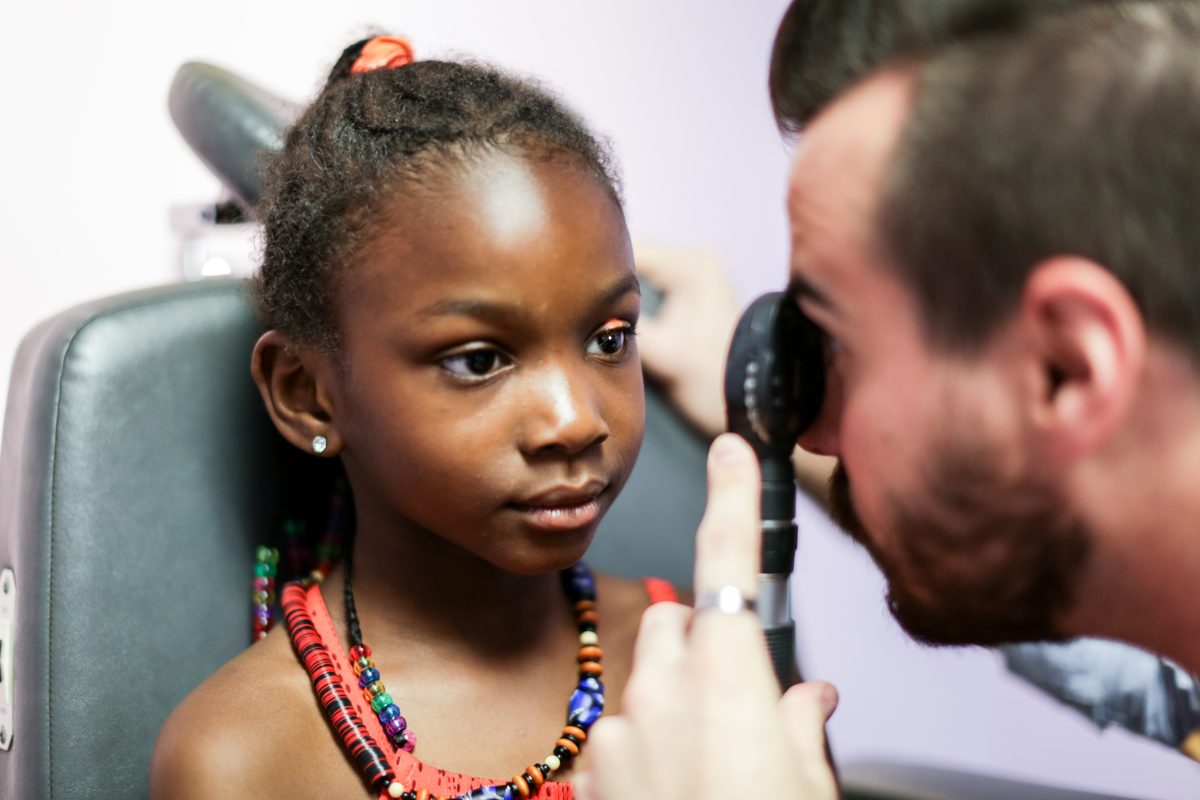We seek to prepare our students for the future of optometric practice by teaching them to think critically as life-long learners who understand the scientific basis of the profession and apply the fundamentals of evidence-based practice to patient care. The goals of the optometry program are to graduate optometrists who are knowledgeable, clinically competent, professional and ethical., The program is also designed to provide opportunities to customize learning to student interests on advanced topics through elective courses, microcredential certificates, research opportunities, and the selection of advanced clinic assignments.
The professional program leading to the Doctor of Optometry (OD) at the SUNY College of Optometry is four years in duration. Advanced standing options are available for qualified students.
Located on two dynamic campuses, students can choose the iconic New York City campus with a singular vertical building or the newly opened campus in Syracuse, NY – a vibrant hub of students and university life on the SUNY Upstate Medical University campus.* The campuses share learning resources and offer lectures through a hyflex classroom supported by technology connecting the two campuses. All labs and clinical experiences are in person.
The professional program leading to the Doctor of Optometry (OD) at the SUNY College of Optometry is four years in duration. Advanced standing options are available for qualified students.
*SUNY College of Optometry Upstate program is pending MSCHE accreditation approval.

The curriculum integrates the basic biological and vision sciences that form the foundation of clinical practice, teaches the fundamentals of optometric practice, and develops critical thinking and the application of evidence-based practice in clinical care.
Patient care begins early in the program and continues throughout all four years with increasing responsibilities under the supervision of our expert clinical faculty at the University Eye Center (UEC), Upstate University Center for Vision Care, and through fourth year externships that include sites around the country.
SUNY Optometry considers the whole student during the admissions process. A high undergraduate GPA and high OAT scores are only two of the factors that we use to decide if a candidate is a good fit for us. The Admissions Committee also considers the quality of the candidate’s undergraduate institution, type of program pursued, progression of grades, extracurricular activities, leadership and community involvement, communication and interpersonal skills, letters of recommendation, personal interview, professionalism, and commitment to the profession. Only the applicants with the strongest credentials will be invited to the College for an interview.
Out-of-state and foreign residents are encouraged to apply. We do not discriminate against out-of-state residents for admission. Most out-of-state US citizens are eligible for in-state tuition after one year at SUNY Optometry.



By graduation, students in our OD program on both campuses will have demonstrated knowledge of the programmatic learning objectives, their application of evidence-based clinical optometry, and the professionalism and ethics expected in healthcare professionals. These outcomes are described in each of the areas that follows:
The OD program learning objectives are based on the Attributes of Students Graduating from Schools and Colleges of Optometry, published by the Association for Schools and Colleges of Optometry (2011)



The college uses various teaching, delivery, and assessment methods to help students meet the programmatic learning objectives and apply them for effective patient care.

Assessment of student learning at the program level occurs through multiple mechanisms including measurement of key performance indicators
Other sources of information tracked include, but are not limited to:
The College’s assessment plan can be found at:
Assessment_Plan.pdf
Key performance indicators designated with an asterisk are published in Factbook


Data collected for the OD program is analyzed by the Departments and the Office of Academic Affairs to determine if students are meeting the program’s educational leaning objectives. When data suggests substantive shortcomings, potential solutions are formulated and implemented.
While the analysis and formulation of potential solutions may be initiated at various administrative levels related to the OD program, the forums/offices best suited for analysis, planning and implementation are:

Except applicants attending English-language Canadian universities.
In addition to the application materials required of all incoming students, you will need to have your high school and college records evaluated by World Education Services, Inc. More information is available at World Education Services.
If English is your second language, you will be required to take the Test of English as a Foreign Language (TOEFL) if you’ve been in the United States for fewer than three years or if the Admissions Committee requires it of you. A score of 550 or greater is required. More information is available at the Education Training Service.
Graduates of foreign colleges of medicine, dentistry, osteopathy or veterinary medicine can be considered for admissions by meeting all regular admissions requirements, but will not be considered for Advanced Standing. Exemption from individual courses shall be determined by the Dean of Academic Affairs in conjunction with department chairpersons and the course instructor.
Foreign Optometric Programs of Study
Graduates of international colleges of optometry seeking advanced standing must apply through OptomCAS; submit two letters of recommendation; detailed syllabi of all post-secondary courses taken; submit Part 1 of the NBEO (or the OAT); and all other regular admission requirements. The advanced standing application is processed separately from the regular first year admissions process. In its deliberations, the Admissions Committee considers, among others, the following factors:
Based upon a recommendation from the Dean’s Council, a decision on admission, program design and requirements for the program completion is made by the Admission Committee

The Doctor of Optometry (OD) program at SUNY College of Optometry meets the educational requirements for licensure in New York State. Through our good faith efforts, we have determined that our OD program also meets the basic educational requirements for licensure in all other US States, and in Puerto Rico and Canada. Additional certifications, testing, and/or background checks, as indicated on this website, may be required for certain clinical privileges as established by the licensing authority in other U.S. states.
More information is available at Optometric Licensure and Scope of Practice Requirements by State